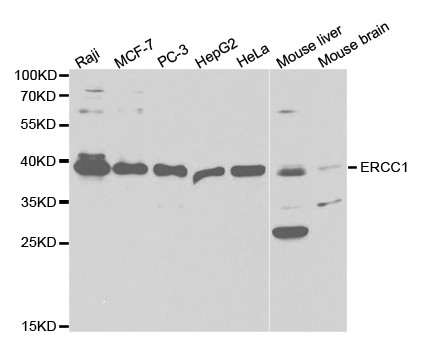ERCC1 antibody
GTX129282
ApplicationsImmunoFluorescence, Western Blot, ImmunoCytoChemistry, ImmunoHistoChemistry, ImmunoHistoChemistry Paraffin
Product group Antibodies
ReactivityHuman, Mouse, Rat
TargetERCC1
Overview
- SupplierGeneTex
- Product NameERCC1 antibody
- Delivery Days Customer9
- Application Supplier NoteWB: 1:500-1:3000. ICC/IF: 1:100-1:1000. IHC-P: 1:100-1:1000. *Optimal dilutions/concentrations should be determined by the researcher.Not tested in other applications.
- ApplicationsImmunoFluorescence, Western Blot, ImmunoCytoChemistry, ImmunoHistoChemistry, ImmunoHistoChemistry Paraffin
- CertificationResearch Use Only
- ClonalityPolyclonal
- Concentration1 mg/ml
- ConjugateUnconjugated
- Gene ID2067
- Target nameERCC1
- Target descriptionERCC excision repair 1, endonuclease non-catalytic subunit
- Target synonymsCOFS4, RAD10, UV20, DNA excision repair protein ERCC-1, excision repair cross-complementation group 1, excision repair cross-complementing rodent repair deficiency, complementation group 1 (includes overlapping antisense sequence)
- HostRabbit
- IsotypeIgG
- Protein IDP07992
- Protein NameDNA excision repair protein ERCC-1
- Scientific DescriptionThe product of this gene functions in the nucleotide excision repair pathway, and is required for the repair of DNA lesions such as those induced by UV light or formed by electrophilic compounds including cisplatin. The encoded protein forms a heterodimer with the XPF endonuclease (also known as ERCC4), and the heterodimeric endonuclease catalyzes the 5 incision in the process of excising the DNA lesion. The heterodimeric endonuclease is also involved in recombinational DNA repair and in the repair of inter-strand crosslinks. Mutations in this gene result in cerebrooculofacioskeletal syndrome, and polymorphisms that alter expression of this gene may play a role in carcinogenesis. Multiple transcript variants encoding different isoforms have been found for this gene. The last exon of this gene overlaps with the CD3e molecule, epsilon associated protein gene on the opposite strand. [provided by RefSeq]
- ReactivityHuman, Mouse, Rat
- Storage Instruction-20°C or -80°C,2°C to 8°C
- UNSPSC12352203
References
- Kurashima K, Kashiwagi H, Shimomura I, et al. SMARCA4 deficiency-associated heterochromatin induces intrinsic DNA replication stress and susceptibility to ATR inhibition in lung adenocarcinoma. NAR Cancer. 2020,2(2):zcaa005. doi: 10.1093/narcan/zcaa005Read this paper
- Kawara H, Akahori R, Wakasugi M, et al. DCAF7 is required for maintaining the cellular levels of ERCC1-XPF and nucleotide excision repair. Biochem Biophys Res Commun. 2019,519(1):204-210. doi: 10.1016/j.bbrc.2019.08.147Read this paper



![ICC/IF analysis of COS7 cells transiently transfected with ERCC1 plasmid using GTX84546 ERCC1 antibody [1B3].](https://www.genetex.com/upload/website/prouct_img/normal/GTX84546/GTX84546_1126_ICCIF_w_23061420_990.webp)
![ICC/IF analysis of COS7 cells transiently transfected with ERCC1 plasmid using GTX84550 ERCC1 antibody [2A7].](https://www.genetex.com/upload/website/prouct_img/normal/GTX84550/GTX84550_1127_ICCIF_w_23061420_151.webp)
![ICC/IF analysis of COS7 cells transiently transfected with ERCC1 plasmid using GTX84555 ERCC1 antibody [2A9].](https://www.genetex.com/upload/website/prouct_img/normal/GTX84555/GTX84555_1128_ICCIF_w_23061420_300.webp)
![WB analysis of HeLa and MCF-7 cell lysate using GTX84559 ERCC1 antibody [3E1]. Loading : 10 ug per lane Dilution : 1:200](https://www.genetex.com/upload/website/prouct_img/normal/GTX84559/GTX84559_4055_WB_w_23061420_614.webp)

